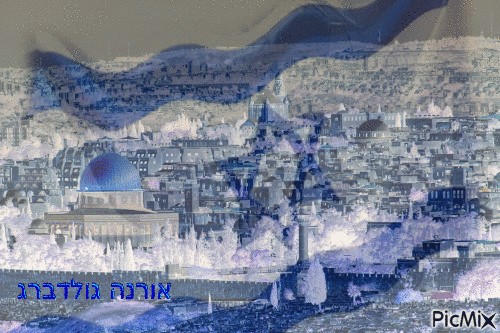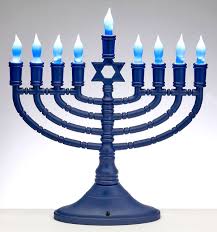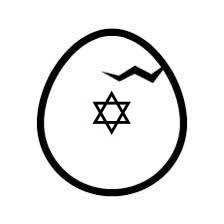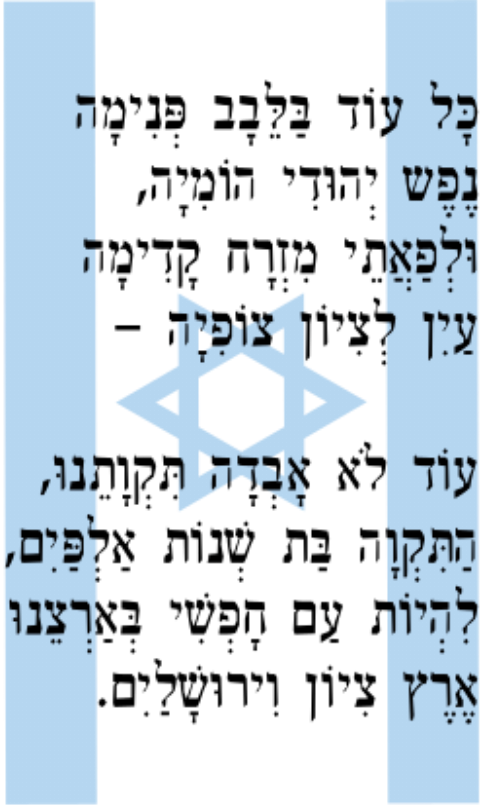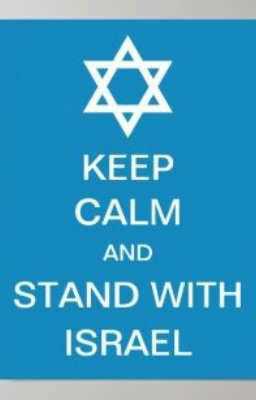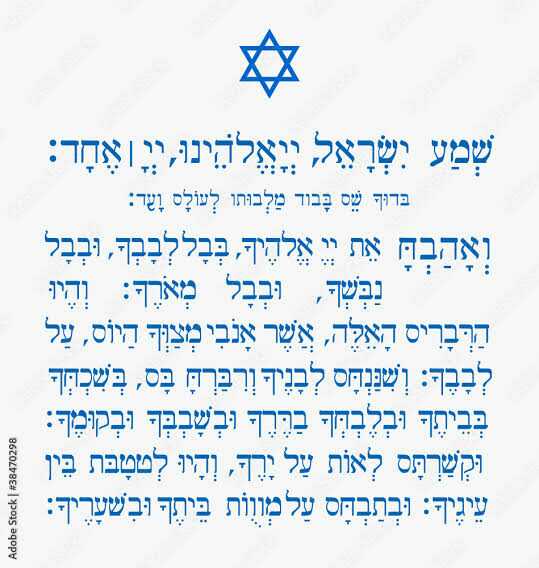
The Profundity of the Shema Yisrael and Its Associated Prayers
The Shema Yisrael, one of Judaism’s most important statements of faith, is an invocation that resonates deeply in Jewish spirituality. The phrase “Shema Yisrael, Adonai Eloheinu, Adonai Echad” translates as “Hear, O Israel, the Lord our God, the Lord is one,” and represents the belief in the oneness of God, a fundamental principle of Jewish monotheism. This prayer is recited daily, both morning and evening, and serves as a constant reminder of God’s presence in the lives of Jews.
In addition to the Shema, other prayers and blessings are intertwined with this practice, such as “Baruch Shem Kevod Malchuto Le Olam” (“Blessed be the Name of His Glory forever”), which is an expression of praise and reverence. The blessing “HaMotzi Lechem Min HaAretz” (“Who brings forth bread from the land”) is recited before meals, acknowledging God’s providence in daily sustenance. The prayer “Borei Pri HaGafen” (“Creator of the fruit of the vine”) is a blessing over wine, symbolizing joy and celebration at special times.
Other invocations, such as “V’zot haTorah” (“And this is the Torah”), “Asher Natan LaNuar Bacholomuhu Vechol HaYomim Al Kol Hai” (“Who gave the Torah to the people of Israel in all times and in all lives”), and “V’Havenu Rachum Al HaAretz” (“And may He bring us compassion upon the land”), reflect the ongoing connection between the Jewish people and their spiritual heritage. The prayer “VeHavienu Shalom Aleinu V’Eiychei Yisrael” (“And may peace be upon us and upon all who live in Israel”) is a plea for peace and harmony, both individually and collectively.
Finally, “Al Hanisim” (“On the miracles”) and “LeChayim Ch’Yehudah VeYisrael L’Soch Al Kol HaMa’amin” (“For the life of Judah and Israel among all who believe”) are expressions of gratitude and hope, celebrating the continuity of Jewish life and faith. These prayers, interwoven with the Shema, form a rich fabric of devotion that not only reinforces Jewish identity, but also fosters a deep connection with the divine.
Meaning of Shema Israel
The Shema Israel is one of the most important prayers in Judaism, and is a central statement of the monotheistic faith. The Hebrew phrase "שְׁמַע יִשְׂרָאֵל" (Shema Yisrael) means "Hear, O Israel." This prayer is an affirmation of the oneness of God and is recited daily by Jews around the world, especially during morning and evening prayers. The full verse, found in Deuteronomy 6:4, is: "Hear, O Israel: The Lord our God, the Lord is one" (שְׁמַע יִשְׂרָאֵל יְהוָה אֱלֹהֵינוּ יְהוָה אֶחָד).
Spiritual Importance
The recitation of the Shema Israel is considered an act of devotion and connection with God. It is a way of reaffirming the belief in the oneness of God and His constant presence in the lives of Jews. The prayer consists of three parts: the Shema itself, a blessing that exalts God's name, and a declaration of love and commitment to Him. The practice of reciting the Shema is a way of internalizing the message of love and devotion to God, reflecting on the importance of loving God with all one's heart, soul, and strength, as mentioned in Deuteronomy 6:5.
Historical Context
Historically, the Shema Israel has its roots in the Torah and is one of the first instructions given to the people of Israel. The rabbis interpreted that the prayer should be recited upon waking and before going to sleep, emphasizing the importance of maintaining awareness of God's presence at all times of the day. The practice of reciting the Shema is so fundamental that the laws on how to properly fulfill this commandment are the first topic discussed in the Oral Torah, specifically in the Mishnah and Gemara (Talmud).
Meaning of the Phrase
The phrase “Hear, O Israel, the Lord our God, the Lord is one” is a statement of Jewish monotheism. The term “Israel” refers to the Jewish people, while “Adonai” is the traditional pronunciation of the tetragrammaton YHWH, which is the personal name of God in Judaism. The oneness of God is a central concept in the Jewish faith, and the recitation of the Shema serves as a constant reminder of this belief.
Practice and Ritual
The practice of the Shema Israel is often accompanied by the wearing of sacred objects, such as the tallit (prayer shawl) and tefillin (small boxes containing passages from the Torah). During the recitation, many Jews turn toward Jerusalem, symbolizing their connection to the land and history of the Jewish people. The prayer is recited aloud and with reverence, reflecting the importance of the moment.
Meaning in Daily Life
The Shema Israel is not just a prayer, but a way of life. The daily recitation serves as a reminder to Jews to live according to God’s commandments and to pass these teachings on to future generations. The practice of reciting the Shema is a way to cultivate spirituality and connection with the divine in the midst of everyday activities.
Spiritual Interpretations
In spirituality, the Shema Israel can be interpreted as a call to connect with the
divine and the search for unity and harmony. The phrase can be seen as an invitation to recognize the divine presence in all things and to seek inner peace. This interpretation broadens the meaning of the Shema, making it relevant not only in the Jewish context, but also in a broader spiritual perspective.
Connection with Other Prayers
The Shema Israel is often associated with other prayers and blessings within the Jewish liturgy. For example, the phrase “Baruch Shem Kevod Malchuto Le Olam” (Blessed be the name of His glory, which is eternal) is recited after the Shema, reinforcing the reverence and holiness of God. In addition, prayers such as “HaMotzi Lechem Min HaAretz” (He who brings forth bread from the earth) and “Borei Pri HaGafen” (Creator of the fruit of the vine) are examples of blessings that express gratitude to God for His gifts.
Meaning of the Blessings
The blessings that accompany the Shema and other prayers are a way of acknowledging God’s greatness and expressing gratitude for His blessings. The recitation of “V’zot haTorah” (And this is the Torah) and “Asher Natan LaNuar Bacholomuhu Vechol HaYomim Al Kol Hai” (Who gave the Torah to the people of Israel in all ages) emphasizes the importance of the Torah in Jewish life and the people’s responsibility to follow His teachings.
Reflection and Understanding
The practice of the Shema Israel and its blessings are not just rituals, but opportunities for reflection and understanding of God’s role in the lives of Jews. The prayer serves as a constant reminder of God’s presence and the importance of living a life of love and devotion. Connection with the divine is an essential part of Jewish identity, and the recitation of the Shema is a way to keep that connection alive.
Conclusion
Related Blessings and Prayers
Baruch Shem Kevod Malchuto Le Olam
The phrase "Baruch Shem Kevod Malchuto Le Olam Va'ed" (בָּרוּךְ שֵׁם כְּבוֹד מַלְכוּתוֹ לְעוֹלָם וָעֶד) is an expression of praise meaning "Blessed be the name of His glorious Kingdom for all eternity." This phrase is traditionally recited in a low voice after the mention of God's name during the recitation of the Shema Yisrael. The origin of this practice goes back to the Talmud, where it is mentioned that this phrase was uttered by Jacob on his deathbed, as an affirmation of faith and loyalty to God (Morasha).
HaMotzi Lechem Min HaAretz
The blessing "HaMotzi Lechem Min HaAretz" (הַמוֹצִיא לֶחֶם מִן הָאָרֶץ) is recited before eating bread. The translation is "He who brings forth bread from the earth." This blessing acknowledges the divine providence that provides us with food and is a way of expressing gratitude to God for His gifts. The practice of reciting this blessing before meals is a way of remembering the importance of food and gratitude in our daily lives .
Borei Pri HaGafen
"Borei Pri HaGafen" (בּוֹרֵא פְּרִי הַגָּפֶן) is the blessing recited before drinking wine or grape juice. The translation is "He who creates the fruit of the vine." This blessing is especially significant during Jewish holidays, such as Shabbat and the holidays, where wine plays a central role in the celebrations. The recitation of this blessing symbolizes the joy and holiness of the moment, as well as recognizing the divine origin of the wine.
V'zot HaTorah
"V'zot HaTorah" (וְזֹאת הַתּוֹרָה) is an expression that means "And this is the Torah." This phrase is often used in contexts of Torah teaching and learning, emphasizing the importance of studying and passing on the sacred teachings. The recitation of "V'zot HaTorah" is common during Torah readings in synagogues, especially at the conclusion of a reading cycle, such as on Simchat Torah, when the joy of the Torah is celebrated .
Asher Natan LaNuar Bacholomuhu Vechol HaYomim Al Kol Hai
The blessing "Asher Natan LaNuar Bacholomuhu Vechol HaYomim Al Kol Hai" (אֲשֶׁר נָתַן לַנּוּעַ בַּכֹּל מוּהוּ וְכָל הַיָּמִים עַל כָּל חַי) is an expression of gratitude to God for giving us life and the ability to live fully. This blessing is a way of acknowledging the divine presence in our lives and the importance of each day that is given to us. The practice of reciting this blessing can be seen as a reminder of the fragility of life and the need to cherish it (Morasha).
V'Havenu Rachum Al HaAretz
"V'Havenu Rachum Al HaAretz" (וְהָבֵינוּ רַחוּם עַל הָאָרֶץ) is a blessing that invokes God's mercy upon the earth. This prayer is a plea for God to look upon the world with compassion and bring peace and prosperity. The recitation of this blessing is especially relevant in times of hardship and conflict, when humanity seeks divine intervention to restore harmony and justice (Morasha).
VeHavienu Shalom Aleinu V'Eiychei Yisrael
"VeHavienu Shalom Aleinu V'Eiychei Yisrael" (וְהָבִיאֵנוּ שָׁלוֹם עָלֵינוּ וְאֵיּחֵי יִשְׂרָאֵל) is a blessing that asks God to bring peace upon us and upon the people of Israel. This prayer is an expression of the collective desire for security and tranquility, reflecting the hope that all human beings may live in harmony. The recitation
of this blessing is common during times of communal prayer and celebrations, symbolizing unity and solidarity among Jews (Morasha).
Al Hanisim
"Al Hanisim" (עַל הניסים) is a blessing that thanks God for the miracles performed on behalf of the Jewish people. This prayer is recited during the festivities of Chanukah and Purim, celebrating the divine interventions that saved the Jews in times of crisis. The recitation of "Al Hanisim" is a way of remembering and honoring Jewish history, reinforcing faith in divine protection.
LeChayim Ch'Yehudah VeYisrael L'Soch Al Kol HaMa'amin
Practices and Rituals Associated with the Shema Israel
Recitation of the Shema
The recitation of the Shema Israel is one of the most central practices in Judaism, performed twice a day during morning and evening prayers. The Shema is a declaration of faith that affirms the oneness of God: "Shema Yisrael, Adonai Eloheinu, Adonai Echad" (Hear, O Israel: the Lord our God, the Lord is one). This practice is accompanied by the silent recitation of the phrase "Baruch Shem Kevod Malchuto Le Olam Va'ed" (Blessed be the Name of His Glory, forever and ever), which, although not explicitly mentioned in the Torah, is a tradition that dates back to Yaakov Avinu (Jacob), who uttered it in response to his sons' declaration of faith (Outorah).
Meaning of "Baruch Shem Kevod Malchuto Le Olam Va'ed"
The phrase "Baruch Shem Kevod Malchuto Le Olam Va'ed" is recited in a lower tone, reflecting a respect for the holiness of God's Name. The practice of reciting it quietly is based on the idea that Moses did not institute it as part of the recitation of the Shema, and therefore it should be said silently as a sign of respect. However, on Yom Kippur, when all are elevated to the status of angels, the phrase is recited aloud, symbolizing the unity and holiness of the moment.
The Tallit and the Tzitzit
The third part of the Shema, found in Numbers 15:37-41, mentions the importance of wearing the tallit, a prayer shawl with fringes called tzitzit. The wearing of tzitzit serves as a reminder to observe all of God's commandments. The practice of wearing a tallit during prayer is a way to connect with Jewish tradition and identity, reinforcing the importance of obedience to divine laws .
Blessings Associated with the Shema
HaMotzi Lechem Min HaAretz
The blessing "HaMotzi Lechem Min HaAretz" is recited before consuming bread and is an expression of gratitude to God for providing sustenance. The formula for the blessing is: "Blessed are you, O Eternal our God, King of the Universe, who brings forth bread from the earth." This blessing not only acknowledges the origin of food, but also reflects the spiritual connection between physical sustenance and Jewish spirituality.
Borei Pri HaGafen
Another important blessing is "Borei Pri HaGafen," which is recited before drinking wine. The blessing reads: "Blessed are you, O Eternal our God, King of the Universe, who creates the fruit of the vine." Wine is often used in Jewish ceremonies and celebrations, symbolizing joy and holiness. Reciting this blessing before drinking wine is a way to acknowledge God's generosity and the importance of wine in Jewish traditions.
Special Occasions and Ceremonies
Havdalah
The Havdalah ceremony, which marks the end of Shabbat, is another significant time involving blessings. During Havdalah, four blessings are recited, beginning with the blessing of wine, followed by the blessing of spices, and finally the blessing that separates the sacred from the profane. This ceremony is a form of transition between the sacred time of Shabbat and the ordinary week, reinforcing the importance of time and holiness in Jewish life.
Shehecheyanu
The "Shehecheyanu" blessing is recited on special occasions, such as holidays and significant events, to express gratitude to God for allowing these moments to come. The formula is: “Blessed are you, O Lord our God, King of the Universe, who has kept us alive, sustained us, and enabled us to reach this time.” This blessing is a way of acknowledging the continuity of life and the importance of each moment .
Reflection and Understanding
The practices and rituals associated with the Shema Israel and its blessings reflect the deep connection between spirituality and daily life in Judaism. Each blessing and each recitation are opportunities for the faithful to express gratitude, reverence, and commitment to God’s commandments. The recitation of the Shema, in particular, serves as a constant reminder of the oneness of God and the importance of living in accordance with His teachings.




